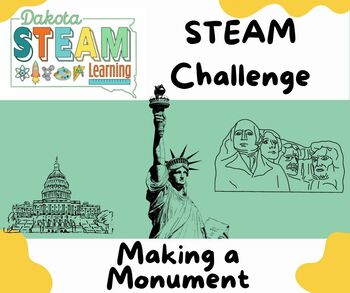Art STEAM: Making a Monument
- Google Drive™ folder

Description
STEAM Challenge: Making a Monument
Learn and use key techniques sculptures use to build and create monuments! In addition, learn about scaling and technique while making your own modeling clay scale model of a monument you design.
What is STEAM?
STEAM is about Community, Collaboration, and Confidence! STEAM programming is essential for communities. STEAM is so much more than just fun science, technology, engineering, art and math activities. When STEAM is done right, it challenges kids to solve problems with many answers. Children have to take their knowledge and apply it to new situations to solve complex questions.STEAM is done best in a collaborative learning environment with others. By asking kids to not only look at their own work with a critical eye, but respectfully analyze and learn from others, they build both collaboration and communication skills. These skills are an important component to the 21st century learning skills.Through STEAM experiences, children not only grow as learners but as people. Kids' self-esteem, self-image, and self-worth all flourish when they are shown all the possibilities of learning. They learn about a growth mindset to solve hard problems and accomplish tasks that they never knew they were capable of. STEAM creates problem solvers by requiring constant reflection and adjustments to arrive at an action plan and solution.
Try Art the STEAM way!
THESE ARE NOT TRADITIONAL ART LESSONS. All of Dakota STEAM Learning's art lessons have been designed from a STEAM perspective. What this means is that students are asked to try and figure out how the art is made before explained. Our goal is to develop critical thinking skills and we use art to achieve our goal. One way we set out to develop critical thinking skills is to take a finished product and wonder how the art was created! Taking a finished product and trying to back map the process is a difficult skill and really challenges students to think critically. Every art lesson includes a step which identifies the STEAM within the art style. This design allows students to see the connections between science, math, technology, engineering, critical thinking skills, and creativity when creating artistically. The power of STEAM is the interdisciplinary nature and we have taken that approach with our art lessons!
Click here to see a video showing our process for teaching art classes, the STEAM way
Reasons to LOVE our STEAM art lessons:
Why you will love using a STEAM Art lesson with students:
✨Students get to be creative and think critically to solve hard problems!
✨Integration of content areas! Most lessons are linked to STEAM strands and learning is reinforced in an artistic atmosphere.
✨All lessons integrate the 4Cs (critical thinking, creativity, communication, and collaboration) of 21st century learning in a natural way.
Why your students will love doing a STEAM art lesson:
✨Students get to create! They make beautiful artwork in a new style.
✨Students get to interact with several STEAM strands/pillars in a new way!
✨Many of our art lessons include mini science or math explorations students love to try. ✨STEAM connections help students in other subjects as well.
This bundle includes the following:
✅Classroom Google Slides: A great visual representation which guides teacher instruction through the lesson and STEAM journal. Google slides are to guide both teacher instruction and student learning. Slides can be edited or added if changes are minor to meet your material or time constraints needs.
✅Student Activity STEAM Journal: STEAM Journals guide students through the STEAM design process and the inquiry-based steps to complete the project. All student documentation is contained to one packet and packets come with both blank and filled in versions. During the lesson, you can decide how much students document and complete the packet. Also, fill in your own materials if necessary in each journal.
✅Material Sheet: The material sheet is a simple overview of materials, material amounts, tips & tricks, and supplemental materials to use if needing a substitution. The material sheet is designed to guide teachers in ordering an appropriate amount of materials needed to complete the STEAM project.
✅Read First Document: This document is important to view! Our Read First document will describe each item in the folder, how to use, and about copyrighted materials. We have also included videos explaining the process our lessons follow to better help you feel comfortable teaching the lesson.
✅Tips & Tricks for Students and Teachers: The Tips & Tricks page will describe information to guide students during the process, guide educators in the process, and examples of final builds to use as a guide for educators.
Connect with Dakota STEAM Learning
Facebook
Instagram
YouTube
Check out our Creating STEAMers product to display the STEAM process!





